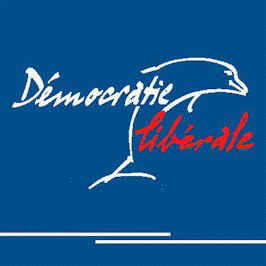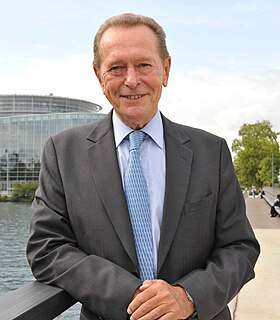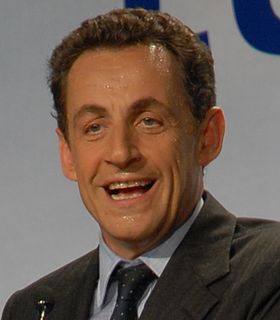Related Research Articles

Jean-Pierre Raffarin is a French politician who served as Prime Minister of France from 6 May 2002 to 31 May 2005.

The Union for a Popular Movement was a centre-right political party in France that was one of the two major contemporary political parties in France along with the centre-left Socialist Party (PS). The UMP was formed in 2002 as a merger of several centre-right parties under the leadership of President Jacques Chirac. In May 2015, the party was renamed and succeeded by The Republicans.

Liberal Democracy was a conservative-liberal political party in France existing between 1997 and 2002. Headed by Alain Madelin, the party replaced the Republican Party, which was the classical liberal component of the Union for French Democracy (UDF).

The Union for French Democracy was a centre-right political party in France. It was founded in 1978 as an electoral alliance to support President Valéry Giscard d'Estaing in order to counterbalance the Gaullist preponderance over the political right in France. This name was chosen due to the title of Giscard d'Estaing's 1976 book, Démocratie française. The party brought together Christian democrats, liberals and radicals, and non-Gaullist conservatives, and described itself as centrist.

The Radical-Socialist and Radical Republican Party was a liberal and formerly social-liberal political party in France. It was also often referred to simply as the Radical Party, or to prevent confusion with other French Radical parties as the Parti radical valoisien, abbreviated to Rad, PR, or PRV.

Regional elections in were held in France on 21 and 28 March 2004. At stake were the presidencies of each of France's 26 regions which, although they do not have legislative powers, manage sizeable budgets. The results were a triumph for the parties of the left, led by the French Socialist Party (PS) in alliance with minor parties including the French Communist Party (PCF), the Left Radical Party (PRG) and The Greens. The left has usually fared moderately well in regional elections, but this was their best result since the regional system was introduced.
Liberalism and radicalism in France refer to different movements and ideologies.

The Republican Party was a conservative-liberal political party in France founded in 1977. It replaced the National Federation of the Independent Republicans that was founded in 1966. It was created by future President of France, Valéry Giscard d'Estaing. It was known to be conservative in domestic, social and economic policies, pro-NATO, and pro-European.

On 12 June 1994 the fourth direct elections to the European Parliament were held in the France. Six lists were able to win seats: an alliance of the centre-right Union for French Democracy and the Gaullist Rally for the Republic, the Socialist Party, the Left Radical Party, the French Communist Party, the National Front and Philippe de Villiers' eurosceptic right-wing dissident UDF list, which formed the Majorité pour l'autre Europe. 53.5% of the French population turned out on election day, actually an improvement on the last election in 1989. The Greens, who were weakened by an Ecology Generation list led by Brice Lalonde and also suffering from internal divisions between the party's left and the right, lost all 9 seats won in 1989. Arlette Laguiller's Trotskyst Workers' Struggle (2.27%), Jean-Pierre Chevènement's left-wing eurosceptic Citizens' Movement (2.54%), the L'Europe commence à Sarajevo List (1.57%) and the agrarian populist Hunting, Fishing, Nature, Traditions (3.96%) were among the notable lists which did not pass the 5% threshold.
The Centrists, formerly known as New Centre and European Social Liberal Party, is a centre-right political party in France formed by the members of the Union for French Democracy (UDF) – including 18 of the 29 members of the UDF in the National Assembly) – who did not agree with François Bayrou's decision to found the Democratic Movement (MoDem) and wanted to support the newly elected president Nicolas Sarkozy, continuing the UDF-Union for a Popular Movement (UMP) alliance.
The Reformers is a libertarian and liberal faction within The Republicans, formerly called the Union for a Popular Movement (UMP).
Democratic Convention is a centrist-liberal political party in France led by Hervé de Charette. It is the continuation of the Popular Party for French Democracy, established in 1995.

Jean-François Copé is a French politician. He is Mayor of Meaux. He was Spokesperson for the French Government between 2002 and 2007, and assumed other tenures in the government—including Minister of the Budget—at the same time. He was also Deputy (Député) for the 6th constituency of Seine-et-Marne, and President of the Union for a Popular Movement (UMP) Group in the French National Assembly. In November 2010 he became General Secretary of the UMP. In August 2012 he announced that he would run for the presidency of the UMP, facing the former Prime Minister François Fillon.

Regional elections were held in France on 15 March 1998. At stake were the presidencies of each of France's 26 regions, which, though they don't have legislative autonomy, manage sizeable budgets.
The Liaison Committee for the Presidential Majority is a structure initiated by Nicolas Sarkozy to coordinate the political parties that support his action.

The National Centre of Independents and Peasants is a liberal-conservative and conservative-liberal political party in France, founded in 1951 by the merger of the National Centre of Independents with the Peasant Party and the Republican Party of Liberty.
The 2012 leadership election of the Union for a Popular Movement (UMP), a political party in France was held on 18 November 2012. It renewed the leadership structures of the UMP following Nicolas Sarkozy's defeat in the 2012 presidential election and the party's defeat in the subsequent legislative election. The disputed results led to the first open crisis in the UMP since its creation in 2002.

The 2004 Union for a Popular Movement leadership election was held on November 28, 2004 to elect the leadership of the French Union for a Popular Movement. The congress was organized after the UMP's first president, Alain Juppé, was forced to resign from the party's presidency following his conviction in a corruption scandal.
The 2002 Union for a Popular Movement leadership election was held on November 17, 2002 to elect the leadership of the newly created Union for a Popular Movement.
References
- ↑ UMP : la Droite forte en tête du scrutin, Le Figaro , 20 November 2012